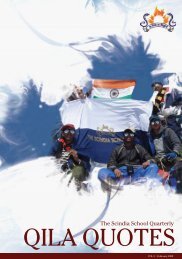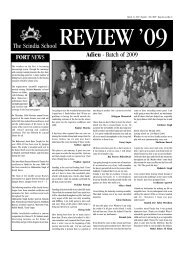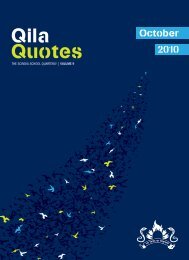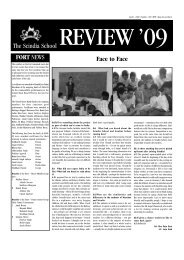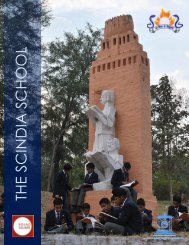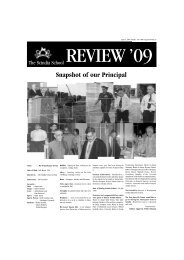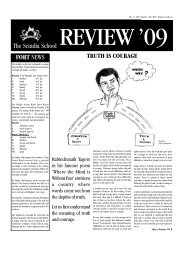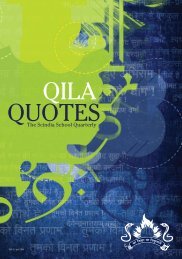31st July 2010 - The Scindia School
31st July 2010 - The Scindia School
31st July 2010 - The Scindia School
Create successful ePaper yourself
Turn your PDF publications into a flip-book with our unique Google optimized e-Paper software.
QILA<br />
QUOTES<br />
<strong>The</strong> <strong>Scindia</strong> <strong>School</strong> quarterly Vol 8 | JUL <strong>2010</strong><br />
"<strong>The</strong> T-shirt on the tree depicts the growth of a tree like a human being. In today's world, we curtail their growth and even the chances<br />
of their survival. <strong>The</strong> shirt signifies that the <strong>Scindia</strong>ns will protect them and let them live." - Jivitesh Mazumdar, the Artist
principal’s message 04<br />
editorial<br />
students’ achievements<br />
old boys’ news<br />
alumni section<br />
Rain water harvesting on Gwalior Fort<br />
By Atul Dev, Ex Md ’5<br />
05<br />
08<br />
09<br />
10<br />
<strong>The</strong> Founder<br />
Maharaja Madhavrao<br />
Jayaji Rao <strong>Scindia</strong><br />
Mr Dinesh Madhwal (HM of Jayappa house) involving the students in the beautification of the house<br />
Board of Governors<br />
President<br />
H.H. Maharaja Jyotiraditya<br />
M. <strong>Scindia</strong><br />
Members<br />
Shrimant Rajmata Madhaviraje<br />
<strong>Scindia</strong><br />
Mr. Vinay Kumar Modi<br />
Mr. Mahesh Gandhi<br />
Mr. Arun Kanodia<br />
Mr. Harpal Singh<br />
Mr. Rajendra S. Pawar<br />
Mr. Arun Kapur<br />
Mr. Kapil Dev<br />
Mr. Bharat V Patel<br />
Mr. Anurag Bansal<br />
Mr. Vivek Narayan Shejwalkar<br />
Secretary/Principal<br />
Mr. Samik Ghosh<br />
Vice - Principal<br />
Mr. Jayant Tengshe<br />
Bursar<br />
Lt. Col. Jayant Rao<br />
<strong>Scindia</strong> Old Boys' Association<br />
President<br />
Lt. Gen S.P.S. Dhillion<br />
Vice President<br />
Mr. Vikram Mathur<br />
Mr. Gopal Bhargava<br />
Treasurer<br />
Mr. K.M. Agarwal<br />
Secretary<br />
Mr. Prashant Gangwal<br />
JT. Secretary<br />
Mr Sandeep Agrawal<br />
<strong>School</strong> Contact Details<br />
<strong>The</strong> <strong>Scindia</strong> <strong>School</strong>, <strong>The</strong> Fort,<br />
Gwalior - 474008. MP, INDIA.<br />
Telephone . : +91-751-2480750<br />
Fax : +91-751-2480650<br />
E-mail : office@scindia.edu<br />
Website : www.scindia.edu<br />
<strong>2010</strong><br />
july<br />
contents<br />
Sustainable Development<br />
Subhash C Anand, Ex Ja’62<br />
interview<br />
Interview of Mr. A.N. Dar<br />
with Aayush Tandon<br />
faculty<br />
Environmentally <strong>Scindia</strong>n<br />
Col Jayant Rao, Bursar<br />
literary section<br />
Nature's Lesson<br />
Sugandha Shukla, VIII A<br />
<strong>The</strong> Battle is far from Won<br />
Tuhin Pandey, XI D, Editor in Chief<br />
Debate: Earth hour in schools - mere tokenism<br />
Sidhivinayak Singh, X E<br />
fort fables<br />
Eco Club<br />
13<br />
15<br />
19<br />
22<br />
Every effort has been made to ensure the accuracy of the information printed in<br />
this edition of Qila Quotes. If an error has occured, please accept our apologies and<br />
contact the editor at pujap@scindia.edu.
from the<br />
principal's desk<br />
<strong>The</strong> theme for this issue is our concern for the environment. We may not be able to<br />
come up with new solutions to the problems or to identify causes hitherto undiscovered<br />
but it is good to talk and to keep the discussion alive.<br />
As I browsed through the articles of this issue, I went down memory lane to my childhood days at<br />
Santiniketan. Our nature study classes used to be walking lessons. We followed our teacher,Shri<br />
Barin Moulik, around the campus. He helped us identify trees and observe the habitats of various<br />
insects and birds. We were driven by curiosity which over the years transformed into love for the flora<br />
and fauna and an instinctive understanding.<br />
Gurudev Rabindranath Tagore introduced Vrikshropan, a ceremony to celebrate nature’s bounties.<br />
In the songs composed for the occasion, he called the tree the flag of victory over the desert. <strong>The</strong><br />
saplings to be planted were children who were invited to loving human company. <strong>The</strong> students<br />
recited short poems seeking the blessings of the five elements for the saplings. Interestingly,<br />
Vrikshropan was followed by Halakarshan, the festival of tilling the soil. <strong>The</strong>y complimented each<br />
other. While Vrikshropan was about caring for Mother Earth, Halakarshan meant going back to her<br />
for our sustenance.<br />
<strong>The</strong> articles in this edition give us glimpses of the important efforts made at the Fort in the past as<br />
well as the endeavours and concerns of the present generation. A story drives the point home in an<br />
imaginative style.<br />
I hope that the <strong>Scindia</strong>ns will always be proactive in protecting the environment wherever they are.<br />
Samik Ghosh<br />
Principal <strong>The</strong> <strong>Scindia</strong> <strong>School</strong><br />
<strong>The</strong> Principal shares a few tips about nature photography<br />
with Palaash Bhargava and Rakesh Raushan<br />
04 PRINCIPAL'S<br />
MESSAGE<br />
VOL 8 | Jul <strong>2010</strong>
Editorial<br />
Academics<br />
Faculty News<br />
Student Exchange<br />
Environment is no more a mere issue. It is a serious concern considering that we have<br />
only one planet to live. We humans have no ethical or moral right to destroy it. This<br />
cameo captures the plight of the Earth and the articles elaborate on what may certainly<br />
befall on us if quick remedial measures are not taken.<br />
<strong>The</strong> issue also aims to highlight the strides<br />
taken by the school and the students<br />
towards ecological conservation. Being an<br />
environmentally proactive and sensitive school<br />
we use recycled paper for Qila Quotes and<br />
have also done away with its plastic cover.<br />
Rainwater harvesting, drip irrigation, campus<br />
cleaning and the activities of the Eco Club all<br />
contribute to sensitizing the students to be in<br />
sync with nature.<br />
<strong>The</strong> quarter (April-June) began with the classes<br />
VI- VIII preparing for their annual exams. <strong>The</strong><br />
entire month remained busy with a number<br />
of interesting activities like the annual English<br />
and Hindi play and the junior house reports.<br />
All students with the exception of classes XI<br />
and XII left the Fort on the 24th of April for the<br />
keenly awaited summer vacations.<br />
Like every year this was the time when the<br />
administrative staff took care of the repair<br />
and renovation of the existing buildings and<br />
various new additions have been made to the<br />
infrastructure. A generator has been installed<br />
in the Junior <strong>School</strong>. A 100 KV transformer has<br />
been put midway between the <strong>School</strong> gate and<br />
Mahadji house to prevent drop in voltage. <strong>The</strong><br />
roofs of Madhav and Shivaji houses have been<br />
recast with RCC.<br />
Sports generate tremendous excitement among<br />
the <strong>Scindia</strong>ns so due attention has been<br />
given to provide better facilities and better<br />
equipment. <strong>The</strong> turf cover of the cricket pitch<br />
has been extended by 70 feet. An imported<br />
cricket bowling machine has been purchased<br />
for improving our cricket training. A German air<br />
rifle has been purchased for the shooting club.<br />
Appointments have been made to the <strong>School</strong><br />
Prefectorial Board. This year some new posts<br />
have been created. It is hoped that each of the<br />
prefects will carry out his assigned duties with<br />
sincerity and dedication thereby assisting in<br />
the smooth functioning of the school.<br />
<strong>The</strong> Government of Sikkim has decided to<br />
sponsor the education of seven academically<br />
advanced students at <strong>The</strong> <strong>Scindia</strong> <strong>School</strong>. All<br />
expenses related to their tuition, boarding and<br />
lodging fee as well as personal expenses will<br />
be borne by the Government.<br />
Competitions<br />
<strong>The</strong> <strong>School</strong> hosted the 8th H.H. Maharaja<br />
Madhavrao <strong>Scindia</strong> Memorial Cricket<br />
Tournament. Eight schools participated in the<br />
cricket extravaganza. Each day the spectators<br />
got to see great display of cricketing excellence.<br />
<strong>The</strong> tournament was won by Modern <strong>School</strong>,<br />
Delhi in a keenly contested final match against<br />
YPS Patiala. <strong>The</strong> tournament was played on a<br />
thirty over format.<br />
Cyber <strong>Scindia</strong> hosted an Inter <strong>School</strong> IT<br />
based event Suryodaya ’10. Ten participating<br />
schools took part in competitions like Web Site<br />
Designing, Multimedia Presentation, Digital<br />
Photography and Editing, Computer Assembly,<br />
C++ Programming, Composite Video Making<br />
and Gaming event (counter strike). <strong>The</strong> overall<br />
Suryodaya Fest running trophy for excellence in<br />
IT was awarded to <strong>The</strong> <strong>Scindia</strong> <strong>School</strong>.<br />
<strong>The</strong> Prefectorial Board <strong>2010</strong>-11<br />
Principal Mr. Samik Ghosh with the students of<br />
<strong>The</strong> <strong>Scindia</strong> <strong>School</strong> HH Cricket team<br />
<strong>The</strong> <strong>Scindia</strong>ns with the Suryodaya Fest trophy<br />
Students of class XI during the summer camp Faculty members at the offsite programme Yashraj Nain, Ujjaval Agarwal and Mr R.K. Kapoor<br />
in London<br />
<strong>The</strong> summer camp initiative that began last<br />
year for class 12 was extended to class 11<br />
students this year. As would be recalled, the<br />
major reason to shift from winter study camp to<br />
summer camp was to be able to complete as<br />
much syllabus as possible before the summer<br />
holidays. As we saw, this had two benefits:<br />
students could then utilize the holidays to<br />
revise portions or prepare ahead. Secondly,<br />
the entire syllabus would then be finished by<br />
around November end every year thus offering<br />
teachers adequate time for revision and for<br />
practising model papers. As class XI and XII<br />
curricula are closely linked roping in class<br />
XI students in this initiative was considered<br />
necessary. Accordingly they reported after a<br />
short break following their board examinations<br />
and underwent two weeks of rigorous summer<br />
camp. <strong>The</strong>re was sufficient seriousness among<br />
all the students and much was achieved as per<br />
the targets and intentions.<br />
Soon the board results also came in. This year<br />
there was a major change as regards class 10<br />
result pattern as grades were awarded instead<br />
of marks. Our students have done rather well<br />
in most subjects, particularly in English and<br />
Social Studies. Five of our students were on<br />
compartment.<br />
<strong>The</strong> class 12 students have performed<br />
extremely well in some subjects and not<br />
so well in a few other subjects. Teachers of<br />
Physics, Chemistry and Mathematics were<br />
quite disappointed with the results whereas<br />
Psychology, Multimedia and Biology had<br />
cause to celebrate. <strong>The</strong> commerce stream<br />
obtained good results as every year except for<br />
Economics.<br />
Mr R.K. Kapoor went to Woodbridge <strong>School</strong> U.K.<br />
on a regular teacher exchange programme. He<br />
went there to create a platform which would<br />
help both the schools to work in a collaborative<br />
environment for various subjects. This objective<br />
has been achieved. We’ll soon start with active<br />
collaboration in chess and fine art which will<br />
be followed by English and History.<br />
Mr Vishesh Sahai went on a teacher exchange<br />
to Ellesmere College, Shropshire, UK. He taught<br />
economics, assisted in the tennis academy<br />
and the cricket set. During his stint there he got<br />
exposed to different teaching methodologies<br />
and approaches. He returns with increased<br />
motivation, refreshed enthusiasm and energy<br />
for teaching which will benefit the school and<br />
the students.<br />
<strong>The</strong> entire staff went for an offsite programme<br />
to Bhopal. For three days the entire faculty<br />
spent long hours going over the success and<br />
failures of the year gone by and planning<br />
teaching learning strategies for the coming<br />
term. <strong>The</strong> staff also enjoyed a wonderful get<br />
together organised by SOBA Bhopal.<br />
obituary<br />
Nine students went on an exchange to schools<br />
in different parts of U.K. <strong>The</strong> exchange proves<br />
to be a valuable learning tool as the students<br />
get exposed to multi faceted approaches to<br />
acquisition of knowledge. <strong>The</strong> experience of<br />
staying in a new culture helps broaden their<br />
social horizons. <strong>The</strong> students have come back<br />
with enhanced self confidence.<br />
Initiatives<br />
<strong>The</strong> school took up an initiative with the<br />
support of the Old Boys to give opportunities<br />
to the students of Class XII to gain experience<br />
of actual professional life during the summer<br />
vacation. Ten boys worked in diverse fields<br />
gaining first hand experience of the area of<br />
their choice like stock broking, export, printing<br />
technology and metal work. <strong>The</strong>y found it a very<br />
enriching experience. We wish to continue with<br />
this in the future.<br />
With profound grief we mourn the sad demise of Mr. B.K. Singh, former<br />
teacher and House Master (Jeevaji House). May his soul rest in peace.<br />
We extend our heartfelt condolences to all the family members.<br />
Siddharth Bansal with Rahul Bhargava<br />
(Ex Jyotiba ’04) during the summer internship<br />
<strong>The</strong>re is a firm resolve among students and<br />
faculty to produce much better results for the<br />
coming year. Increase in the number of working<br />
days in <strong>2010</strong>-11 and an extra hour being<br />
added to the daily academic time table will<br />
make a difference.<br />
06 EDITORIAL<br />
VOL 8 | Jul <strong>2010</strong>
Students'<br />
Achievements<br />
Sheetal Verma (ExRn’10) and Arjun Saraswat (ExRn’10) have been awarded 100% scholarship<br />
by the University of Westminster. Sheetal will be pursuing B.Sc. Accountancy and Management<br />
while Arjun will be pursuing B.A. - Business Management, Human Resources Management<br />
Kush Singh, Devavrat Pawar and Vaibhav Kirar<br />
hoisting the <strong>School</strong> flag at Mount Sitidhar<br />
As part of the PASCH project (Schulen Partner<br />
der Zukunft), Aayush Tandon and Asad Khan<br />
Chowdhary went on a 100% scholarship to<br />
Wallbeck in Germany. <strong>The</strong>y spent three weeks<br />
there attending workshops and seminars<br />
with a view to enhancing their proficiency in<br />
the German language. It was an enriching<br />
experience for both as apart from honing their<br />
language skills they also got exposed to the<br />
culture of the host country.<br />
__________________________________<br />
Aayush Tandon and Sidhivinayak Singh<br />
participated in the Inter <strong>School</strong> debate hosted<br />
by Daly College. Aayush stood first in the<br />
debate and the school team bagged the first<br />
position.<br />
__________________________________<br />
As part of <strong>The</strong> Duke of Edinburgh Expedition,<br />
this year the students were scheduled to scale<br />
Fluted Peak in Lahaul Spiti Valley, but due<br />
to inhospitable weather conditions the team<br />
finally decided to climb mount Sitidhar which<br />
was comparatively safer.<br />
<strong>The</strong> team members of the Mountaineering<br />
Expedition were Devavrat Pawar, Vaibhav<br />
Singh Kirar, Kush Singh, Rachit Dhamawat,<br />
Mohit Agarwal, Anubhav Sarkar, Bharat<br />
Khanna, Vikram Bengani, Siddharth Bansal,<br />
Harshwardhan Singh Muktawat and Rishabh<br />
Jain. <strong>The</strong>y were escorted by Mrs. Raksha Siriah<br />
and Mr. Dhirendra Sharma.<br />
__________________________________<br />
<strong>The</strong> winning team of the Daly College Debate with<br />
Mr Sumer Singh, Principal Daly College<br />
Aayush Tandon and Asad at Walbeck with friends<br />
Sheetal Verma (Ex Rn ’10) and<br />
Arjun Saraswat (Ex Rn ’10)<br />
<strong>The</strong> members of the Mountaineering Expedition<br />
08 STUDENT<br />
ACHIEVEMENTS<br />
VOL 8 | Jul <strong>2010</strong>
Old Boys' News<br />
It is a matter of pride for all <strong>Scindia</strong>ns that Mr. Bharat Patel (Ex Md ’61) Board<br />
Member and Madhav Awardee (2005), has been appointed Advisor to the<br />
Chairman, Indian Premier League. We are certain that with Mr. Patel’s intervention<br />
the tournament will bring glory to the game of cricket in future.<br />
Rain water harvesting<br />
on Gwalior Fort<br />
Not many are aware of the engineering foresight that was shown by the rulers and military<br />
leaders of early 15th century when they conceived of and built the Gwalior Fort.<br />
Mr Bharat Patel (Ex Md ’61)<br />
HH Maharaja Jyotiraditya <strong>Scindia</strong> flagging<br />
off the car rally<br />
SOBA-North America Get together at New York<br />
09<br />
OLD BOYS'<br />
NEWS<br />
VOL 8 | Jul <strong>2010</strong><br />
A SOBA car rally took place from 2nd to 4th<br />
April, <strong>2010</strong>. On the 2nd, all the participants<br />
assembled at the National Sports Club of<br />
India, New Delhi. Car numbers, stickers, T-shirts,<br />
caps and rally kits were distributed. <strong>The</strong> rally<br />
was flagged off by HH Maharaja Jyotiraditya<br />
<strong>Scindia</strong>, Lt Gen SPS Dhillon, Mr. SK Rungta<br />
- Chairman SAIL, Mr. Bajoria (Ex-<strong>Scindia</strong>n) -<br />
Director JK Tyres and in charge of motor sports,<br />
and Tutu Dhawan- President FMSCI.<br />
All 62 cars reached Tarangi resorts at 5:30<br />
pm after a 345 Kms run through villages, dirt<br />
tracks and off beaten tracks. In the evening,<br />
the lawns of Tarangi witnessed a party where<br />
the results of the first day were announced.<br />
On the 3rd, the rally was flagged off from<br />
Tarangi at 9:00 am for a 99 Kms run in the<br />
hills with loops and teasers. It flagged down at<br />
Tarangi at 1:00 pm. <strong>The</strong> second day’s results<br />
were announced during the evening party. <strong>The</strong><br />
final results and prize distribution took place<br />
over drinks, dinner, music and dancing beside<br />
the river Kosi.<br />
Participants came from Gwalior, Jhansi,<br />
Dholpur, Agra, Jaipur, Moradabad, Kanpur and<br />
the NCR and were from the batches of 1955<br />
to 2009!<br />
Winners<br />
1st Mr. Rajeshwar Tyagi, Ex Ravindra ’65<br />
2nd Mr. Harmit Singh, Ex Md ’98<br />
3rd Mr. Pawan Bansal, Ex Je’73<br />
__________________________________<br />
SOBA- NA planned a Happy Hour Get Together<br />
on May 19th at the K Lounge in New York.<br />
Being close to a long weekend vacation, the<br />
turnout was modest. What made the evening<br />
more interesting was presence of Alumni of<br />
Daly College and Mayo College also.<br />
Just before breaking for the evening, SOBA<br />
Golf enthusiasts A Khanna and A Mandhle<br />
expressed keen interest to help host a SOBA/<br />
Pan Public Golf Outing in the summer in the<br />
New York / New Jersey area. Looking at the<br />
keen response to Golf in SOBA community in<br />
Delhi and also as a stir to keep the Pan Public<br />
Alumni mingling alive, this is an idea whose<br />
time is not too far off in the future!!<br />
__________________________________<br />
Yatin Singhal(Ex Rn’07) who went on a<br />
100% scholarship to Westminster University,<br />
London to pursue a course in Biotechnology<br />
has passed out with a first class degree.<br />
He is now joining the internationally<br />
renowned pharmaceutical company Novartis<br />
Pharmaceuticals in Liverpool, U.K.<br />
__________________________________<br />
Yatin Singhal (Ex Rn ’07)<br />
Not many are aware of the engineering<br />
foresight that was shown by the rulers and<br />
military leaders of early 15th century when<br />
they conceived of and built the Gwalior Fort.<br />
<strong>The</strong> location of the Fort is unique in that it is<br />
located on a 100 metre high hill that overlooks<br />
and dominates the main route from the North<br />
Indian plains to Central India and further South<br />
to the Deccan Plateau.<br />
Interestingly enough Gwalior Fort was not<br />
built where there was a river, like the Forts at<br />
Agra or Delhi or elsewhere, but where military<br />
needs dictated. It is also clear that water is<br />
one commodity that cannot be created and<br />
humanity cannot live without it. A Fort would<br />
need water to sustain its troops and other<br />
people. <strong>The</strong> then rulers were well aware of the<br />
existence of Suraj Kund, an 8th century water<br />
tank on top of this strategically located hill.<br />
It was after drinking the water from this tank<br />
that the Rajput chieftain, Suraj Sen or Suraj<br />
Pal, is believed to have been cured of a deadly<br />
disease on the advice of Saint Gwalipa, after<br />
whom Gwalior city is named. <strong>The</strong> presence<br />
of Suraj Kund, with its perennial supply of<br />
water, may have encouraged the then rulers<br />
to consider the construction of Gwalior Fort<br />
on top of this hill with its location providing a<br />
strategic advantage.<br />
<strong>The</strong> beloved Fort- we want to keep it green<br />
Numerous water tanks of the Fort were<br />
built of a size and at a location that they<br />
remained perennial sources of water. <strong>The</strong> water<br />
availability in these ‘taals’ was estimated to<br />
cater to 15,000 persons living inside the Fort.<br />
I still recall with nostalgia names of the various<br />
‘taals’ on the Fort – Suraj Kund, Singhara Taal,<br />
Khamba Taal, Jauhar Tank near Gurjari Mahal,<br />
Gangola Taal, Rani Taal, Cheri Taal and Dhobi<br />
Taal, to name a few!<br />
<strong>The</strong> designers of these ‘taals’ simply used the<br />
ancient wisdom of collecting rainwater during<br />
the monsoons and using it for the entire<br />
year. It should be remembered that it is not<br />
feasible for armies to be located inside any<br />
Fort for taking up defence and yet to remain<br />
dependent on water from outside sources.<br />
At Gwalior Fort the problem was even more<br />
acute due to its height above the surrounding<br />
areas. <strong>The</strong>re was no ground water that one<br />
could turn to. One was entirely dependent on<br />
collection, storage and judicious use of the<br />
rain water that fell during the rainy season. <strong>The</strong><br />
‘taals’ have been designed to hold water and<br />
not charge the aquifer, as happens in case of<br />
check dams or ‘johads’.<br />
Gwalior has an average of 88-90 cm of rain<br />
every year. <strong>The</strong> skill lies in making sure that<br />
this rain water does not run off and get wasted.<br />
Thus one needed to have well prepared<br />
catchments which would funnel the water into<br />
the tanks made at selected sites. Unfortunately,<br />
at present many of these catchments around<br />
the ‘taals’ have been encroached upon thus<br />
reducing the catchment surface areas. <strong>The</strong><br />
preservation and use of this water was the<br />
second problem. Note how the ‘taals’ in the<br />
Fort are all lined water tanks. <strong>The</strong>se lined tanks<br />
prevent loss of water due to seepage and are<br />
easy to clean during the dry season just before<br />
the monsoons.<br />
Gwalior Fort provides the<br />
very best example of what<br />
the country can emulate<br />
for enriching their water<br />
availability through rain<br />
water harvesting.<br />
By Atul Dev<br />
Ex Md ’55<br />
(Atul Dev is currently a very active Rotarian who<br />
is involved with a series of water harvesting<br />
projects in Rajasthan.)<br />
10 Alumni<br />
VOL 8 | Jul <strong>2010</strong>
Sustainable<br />
Development<br />
Damage to the environment is an inevitable consequence of worldwide<br />
improvements in the standard of living.<br />
Dr B.S. Bhakuni supervising the campus cleaning activity at the Surajkund<br />
Whilst travelling to Mussoorie on my last visit<br />
to India, I was horrified to notice the extent<br />
of damage deforestation had caused and<br />
noticed that the hills that had once been lush<br />
and green were now so bare and their top soil<br />
eroded to such an extent that it caused the<br />
rain water to flow freely thereby flooding the<br />
plains during the monsoons.<br />
I soon realized that this phenomenon was<br />
nothing new to an emerging country so hungry<br />
to use all its resources for its economic growth<br />
that it blatantly ignored the damage it was<br />
causing with disastrous consequences to the<br />
environment.<br />
Regrettably, over the past 50-60 years there is<br />
very little change in our attitudes and lifestyles<br />
to rectify the damage to the environment<br />
which is now a global problem. This has to be<br />
addressed not only by the rich industrialised<br />
nations but also by the third world and<br />
especially the emerging nations such as India<br />
and China which have now become the largest<br />
air polluters and users of the earth resources<br />
especially fossil fuel.<br />
We now know that climate change will have<br />
a major effect on our environment over the<br />
next 20-30 years as we continue to demand<br />
more of our natural resources. But, by taking<br />
the right steps over the next few years, we<br />
can create a better, healthier environment.<br />
This means a better quality of life overall.<br />
However, this can only be achieved by joint<br />
efforts of all communities and educating our<br />
young generation. This will eventually help cut<br />
emissions of greenhouse gases and protect our<br />
natural environment more widely.<br />
If we start taking action now, together we can<br />
achieve our objectives and secure a better<br />
future for the generations to come. <strong>The</strong> natural<br />
environment will improve considerably.<br />
Pollution will be reduced, so water, soil and<br />
air will be cleaner and of a better quality than<br />
they are today. Habitat, both on land and in<br />
the sea will be better protected, wildlife will<br />
flourish and the extinction of species will slow<br />
down.<br />
That people produce waste is a fact of life,<br />
which we cannot change. Land damage will<br />
continue to rise with the demand for more<br />
housing and agricultural produce. However,<br />
what we can change is how much we produce<br />
and what we do with it. Indeed, managing<br />
waste in a sustainable way - optimising<br />
recycling and re-use, as well as limiting<br />
production- should form the core objective of<br />
our efforts.<br />
Why this is important:<br />
<strong>The</strong> impact of the way we live today means<br />
that by 2030, global average temperatures<br />
will rise much above today’s average. This<br />
will have a significant global impact. Sea<br />
levels will rise, biodiversity will decline and<br />
the frequency of extreme weather events (e.g.<br />
heat waves, droughts, storms, floods) will<br />
increase; this will lead to natural calamities<br />
and the arrival of new diseases. Extreme<br />
measures will have to be taken to protect<br />
those areas of the world most susceptible<br />
to these changes. We will also be forced<br />
to adapt to a changing climate to promote<br />
healthier, improved lifestyles and enhance<br />
local biodiversity.<br />
Biodiversity is life. It is the variety of all life<br />
on Earth including all species of animals and<br />
plants, and the natural systems that support<br />
them. Biodiversity matters and is hugely<br />
important, not just for its own sake but also<br />
because it underpins the vital benefits we<br />
get from the natural environment, because it<br />
contributes to our economy, our health and<br />
wellbeing, and because it enriches our lives.<br />
But human activity is causing the diversity of<br />
life on Earth to be lost at an alarming rate and<br />
drastic actions are required to slow down this<br />
decline.<br />
By taking action now, we may not only be<br />
able to slow some of the changes to our<br />
environment over the next twenty years but<br />
also help protect against further damage in<br />
the future. We should ensure that the society<br />
as a whole has a greater understanding and<br />
awareness of the fact that the environment is<br />
an essential component of our prosperity and<br />
economic growth. <strong>The</strong>refore, we should ensure<br />
that we manage the environment carefully so<br />
that it can continue to provide for us in the<br />
long term, grow and live in a greener society<br />
and thereby support India's ever increasing<br />
population.<br />
If we don't act, soon we will be heading for<br />
an environmental catastrophe. Our future<br />
generations will never forgive us for turning<br />
a blind eye to this global issue and causing<br />
irreversible damage to this beautiful planet<br />
Earth we admire and love so much. <strong>The</strong><br />
advice to all inhabitants should be loud and<br />
clear: Change your lifestyle now if you want to<br />
continue to enjoy the benefits that our planet<br />
Earth provides. Otherwise, one day we maybe<br />
extinct like the dinosaurs.<br />
Subhash C Anand<br />
Ex Ja’62<br />
Financial & Business Consultant<br />
12 Alumni<br />
VOL 8 | Jul <strong>2010</strong>
Interview of<br />
Mr. A.N. Dar<br />
former Principal of <strong>The</strong> <strong>Scindia</strong> <strong>School</strong>, by Aayush Tandon<br />
AT: What qualities should a public<br />
school teacher have<br />
AND: An independent mind, passion for<br />
life and self respect such that he develops<br />
trust and faith in both his students and<br />
colleagues i.e. his community.<br />
This applies not only to public school<br />
teachers but to teachers of any school.<br />
<strong>The</strong> teacher needs to have passion for<br />
life to give him enough energy to enjoy<br />
his work. Today we talk about all kinds of<br />
schools: public, international, world school<br />
and global, etc., which leaves me utterly<br />
confused. For me teaching is not a job<br />
or a profession but a calling: we should<br />
talk about nurturing that is inclusive of<br />
all and not simply teaching. Teachers in<br />
any school are nurturers, and not just<br />
facilitators. Any nurturer anywhere should<br />
have these qualities.<br />
Several teachers in my days in <strong>Scindia</strong>,<br />
my school, who were my role modelsincluding<br />
my father had these qualities in<br />
abundance.<br />
AT: You have been a student and the<br />
Principal of the <strong>Scindia</strong> <strong>School</strong>.<br />
What did you enjoy more and why<br />
AND: As a student I only dreamt of<br />
being a schoolmaster in <strong>Scindia</strong> <strong>School</strong>.<br />
Thank God I didn’t become a master<br />
here because I also dreamt of occupying<br />
the office of the Principal of the <strong>Scindia</strong><br />
<strong>School</strong> and as tradition here is: “Thou<br />
shall not be the Principal of <strong>Scindia</strong> if you<br />
are a teacher.”<br />
As a student, I enjoyed every moment of<br />
my stay here. As the Principal, it hardly<br />
mattered to me whether I was enjoying or<br />
not for my prime concern was to ensure<br />
that I was successful in putting others in<br />
their zone of comfort. It is for history to<br />
judge whether I lived up to my ideals.<br />
I dreamt of being the Principal of <strong>Scindia</strong><br />
<strong>School</strong> because even as a child I felt that<br />
the direction of <strong>Scindia</strong> <strong>School</strong> needed<br />
correction and my colleagues, my board,<br />
my students all helped me during my<br />
tenure here to achieve what I believed.<br />
AT: You have referred to the<br />
tradition of non <strong>Scindia</strong>ns heading<br />
<strong>Scindia</strong>: What about your successor,<br />
Mr. Nirmal Tewari<br />
AND: That is exactly what I meant that<br />
I have believed in corrections in the<br />
direction of the school. However, Mr. K.C.<br />
Shukla, the second Principal of <strong>Scindia</strong><br />
rose from starting here as a warden and<br />
Mr. J. L. Dar became the Principal after<br />
being the VP here. I am certainly happy<br />
that Mr. N. K. Tewari succeeded me.<br />
AT: You used the expression<br />
schoolmaster. According to you,<br />
what is the difference between a<br />
teacher and a schoolmaster<br />
AND: A teacher confines himself to<br />
a subject and text books and a tutor<br />
restricts himself to exams while a<br />
schoolmaster is a mentor i.e. he interacts<br />
with his student in varied ways.<br />
AT: What do you consider as<br />
your most significant moment<br />
in the <strong>School</strong><br />
AND: My departure from the <strong>Scindia</strong><br />
<strong>School</strong> at 10:30 a.m. on April 24th, 2000<br />
– the day I turned 60. I was delighted to<br />
hand over the gown to Mr. Tewari in my<br />
office immediately after my last Assembly<br />
at SMoaT.<br />
That was the day I fulfilled my destiny<br />
and the <strong>Scindia</strong> community bade farewell<br />
to my wife and me. That was the most<br />
significant moment of my life because I<br />
thought my innings were over, unlike many<br />
Indian politicians who linger on and stick<br />
to their chair. I am grateful to the <strong>School</strong><br />
that they bade me farewell at the right<br />
time and in the right manner. <strong>The</strong> moment<br />
had its own dignity. Interestingly, this was<br />
a second farewell for me at <strong>Scindia</strong>: the<br />
first was in 1958 after I completed my<br />
Intermediate (I had lived here since my<br />
birth) and the next was 42 years later as<br />
the retiring head of <strong>Scindia</strong>.<br />
Mr A.N. Dar giving a speech after receiving the Madhav Award<br />
AT: Do you think that student<br />
behaviour has changed over the<br />
years<br />
AND: That is what the world believes but I<br />
don’t. At the Old Boys’ Night at the SMoaT<br />
we saw and heard pop music and you<br />
guys danced. Had I been your age I would<br />
have done the same. How can people<br />
think that human behaviour has changed<br />
I think it’s evolution. Basics are just the<br />
same: grow, interact, enjoy – and die. <strong>The</strong><br />
behaviour of men is evolving and this is<br />
visible in <strong>The</strong> <strong>Scindia</strong> <strong>School</strong> too.<br />
AT: Which is the first place you like<br />
to visit when you arrive at the Fort<br />
AND: <strong>The</strong> trouble with me is that I haven’t<br />
divided the <strong>School</strong> into parts. For me the<br />
world is one place. When I was on the Fort<br />
I wandered. Even in my thoughts I am a<br />
wanderer, a dreamer. Looking down the<br />
Fort wall and walking freely on the roads<br />
– there is history, religion, freedom and<br />
privacy all around. <strong>The</strong> Fort changes at<br />
dawn, during night, under the starlit sky at<br />
midnight. It is painted in different colours<br />
in summer, in winter or during rains.<br />
Mr Dar handing away a trophy during the athletic meet<br />
AT: How do you feel that now the<br />
Assembly Hall will be adorned with<br />
two of your portraits: one as the<br />
former Principal and the other as a<br />
Madhav Awardee<br />
AND: I feel privileged as the only other<br />
person who has this honour is my<br />
schoolmate and then the President of the<br />
Board of the <strong>School</strong>: Late His Highness<br />
Maharaja Madhavrao <strong>Scindia</strong>. Yes, I<br />
also figure in the list of Cariappa Shield<br />
winners. I am really amused because my<br />
name figures in some other boards of the<br />
captains also.<br />
I feel grateful to the <strong>Scindia</strong> Board and<br />
thank God for giving me the opportunity<br />
to serve my alma mater. I get a feeling of<br />
comfort.<br />
AT: Any message for the young<br />
<strong>Scindia</strong>ns<br />
AND: Only one message – be a<br />
schoolmaster, whether at <strong>The</strong> <strong>Scindia</strong><br />
<strong>School</strong> or some other school. Some of you<br />
should actually aspire to be the Principal<br />
of <strong>The</strong> <strong>Scindia</strong> <strong>School</strong>.<br />
Mr. A. N. dar (Ex Rn ’58)<br />
Principal, <strong>The</strong> <strong>Scindia</strong> <strong>School</strong> 1994-2000<br />
Madhav Awardee, 2009<br />
AT: Aayush Tandon<br />
AND: Mr Amar Nath Dar<br />
14 Interview<br />
VOL 8 | Jul <strong>2010</strong>
Environmentally <strong>Scindia</strong>n<br />
Scarcity of water in the <strong>Scindia</strong> <strong>School</strong> campus has been felt from time immemorial as it is<br />
located on a rocky hillock totally devoid of ground water. <strong>The</strong> supply of water from the municipal<br />
sources is inadequate. <strong>The</strong> problem is further compounded by inadequate monsoons.<br />
Even the water reservoirs (Taals) dry up totally,<br />
thereby aggravating the water problem. <strong>The</strong><br />
<strong>School</strong> faces severe water shortage which is<br />
hampering the smooth operation of the <strong>School</strong>.<br />
When I joined the <strong>School</strong> in 2004, I took<br />
it up as a challenge to ameliorate the<br />
condition and introduced measures like rain<br />
water harvesting, mechanical ETP, STPs and<br />
improving the capacity of existing Taals at the<br />
Fort. Notwithstanding my efforts, I noticed a<br />
significant loss of trees and greenery during<br />
the summers. Water is supplied to the <strong>School</strong><br />
through a 3 stage pumping from the source<br />
due to which the cost of water supply is<br />
significantly high. <strong>The</strong> daily requirement of<br />
water on the Fort is 3 lakh litres and the water<br />
supplied through the municipality is just about<br />
1 lakh litres.<br />
With a view to having a holistic approach<br />
on water management, we have initiated<br />
novel methods to harness rain water. Apart<br />
from that, we have installed one mechanical<br />
water recycling plant at the dining hall and<br />
two natural water recycling units. I thought of<br />
following in the footsteps of our ancestors and<br />
got opened hitherto hidden water channels on<br />
the Fort to fill rain water into the Khamba Taal,<br />
Cheri Taal and Rani Taal instead of letting rain<br />
water run off the Fort. Modern earth moving<br />
equipment was used to create new collection<br />
channels, baffle walls and bundhs wherever<br />
possible.<br />
Not satisfied with our efforts, I decided that<br />
some revolutionary steps had to be taken to<br />
save the trees and plantation. We hit upon<br />
Drip irrigation, also known as trickle irrigation<br />
or micro irrigation. This is an irrigation method<br />
which significantly minimises the use of water<br />
and fertilizer by allowing water to drip slowly<br />
to the roots of plants, either onto the soil<br />
surface or directly onto the root zone, through a<br />
network of valves, pipes, tubing, and emitters.<br />
<strong>The</strong>se are generally used on trees and vine<br />
crops with wider root zones. This irrigation<br />
method was brought to our country from Israel.<br />
Some special features of this scheme are:<br />
(a) Except Agriculture College, no other<br />
organisation in Gwalior has adopted drip<br />
irrigation<br />
(b) <strong>The</strong> method is being used by the farmers of<br />
Maharashtra who have hands- on training and<br />
experience. No expertise was available here at<br />
Gwalior.<br />
(c) High water application efficiency<br />
(d) Already, most trees and plantations<br />
including teak and gooseberry which we had<br />
planted last year, are looking healthy and full<br />
of life.<br />
Water, energy and environmental issues have<br />
received a major boost with the arrival of Mr.<br />
Samik Ghosh, our Principal, who is keen on<br />
making the school truly green.<br />
energy for the Fort. Apart from augmenting<br />
the energy supply, tapping these renewable<br />
resources will help our school in mitigating<br />
climate change albeit in a small way. Solar<br />
energy could be made financially viable with<br />
government tax- incentives and rebates. We<br />
are looking specifically at the <strong>School</strong> kitchen<br />
and street lights in the campus; we are already<br />
using solar water heaters in the houses.<br />
With the help of internationally renowned<br />
organisations like TERI (<strong>The</strong> Energy and<br />
Resources Institute), we plan on the utilisation<br />
of solar energy for various applications<br />
including limited power generation for the<br />
campus. <strong>The</strong> possibility of harnessing wind<br />
energy, improved methods of water recycling,<br />
further improving the output of our existing<br />
recycling plants and more efficient methods of<br />
rain water harvesting would be other areas of<br />
collaboration.<br />
In conclusion, I would like to mention the oft<br />
repeated words- “<strong>The</strong> next war is going to be<br />
for water.” With dwindling resources, scanty<br />
rains and global warming, water availability is<br />
going to be a major problem. It has become<br />
extremely essential that we wake up to<br />
this reality and take appropriate measures<br />
like limiting use of water, conservation and<br />
recycling used water before it is too late. We<br />
also need to address the problem of global<br />
warming and educate others about the benefits<br />
of going green.<br />
DRIP IRRIGATION AT THE SICK rooM<br />
CHANNEL FOR THE FLOW OF WATER INTO THE KHAMBA TAAL<br />
DRIP IRRIGATION AROUND DHOBI TAAL<br />
NEW STP PLANT FOR FOUR SENIOR HOUSES<br />
Along with water conservation, we are looking<br />
at the recent developments in the field of<br />
renewable energy systems like solar and wind<br />
Col Jayant Rao<br />
Bursar<br />
16 faculty<br />
VOL 8 | Jul <strong>2010</strong>
Mr Jawale and the students at the Khamba Taal<br />
17 faculty<br />
VOL 8 | Jul <strong>2010</strong><br />
<strong>The</strong> students relaxing at the Khamba Taal after a walk around the Fort
Nature's Lesson<br />
<strong>The</strong> Battle is far from Won.<br />
“Same here. If they go on releasing that grey,<br />
poisonous gas and continue to dirty me, I, too,<br />
will stop my supply of Nitrogen and Oxygen<br />
and fill the atmosphere with harmful gases like<br />
Chlorine and Carbon-dioxide” said Air.<br />
Water agreed “You’re right. We have to take<br />
some action. If they keep polluting and wasting<br />
me, they will have to suffer the consequences.”<br />
He continued, “But humans are ignorant and<br />
they don’t realise their mistake. Don’t you think<br />
that first we should make them realise how<br />
their own actions will become a problem for<br />
them We must give them one last chance”.<br />
“That’s okay, but how will we do that” Land<br />
asked.<br />
“I have an idea. <strong>The</strong>y have created this<br />
alarming situation by mindless use of<br />
Technology. We’ll teach them a lesson in<br />
their own way.” Water replied and whispered<br />
something into their ears. All three of them<br />
giggled and left.<br />
Each of them assumed the form of a human<br />
being and went to a camera shop. From there<br />
they bought a video camera and some video<br />
cassettes. Next they made a documentary film<br />
showing the callousness of humans in their<br />
daily lives which had resulted in pollution and<br />
destruction. <strong>The</strong>n with the help of video editing<br />
they showed what kind of future the humans<br />
were likely to have if they didn’t mend their<br />
19 Literary<br />
Section<br />
VOL 8 | Jul <strong>2010</strong><br />
Tired of the increasing pollution and the destruction wreaked by mankind,<br />
Land, Air and Water once met to discuss the matter.<br />
Land said “Enough is enough! If they go on digging and polluting me like this,<br />
I’ll not provide humans with food and minerals”.<br />
ways. It was quite an effective video and they<br />
were sure that it would have the desired effect.<br />
<strong>The</strong> only problem they now had was about<br />
broadcasting it when suddenly Air jumped up<br />
and exclaimed, “I know! I know how we can<br />
do it. <strong>The</strong> IPL matches are going on now-adays<br />
and people are crazy about them. Today<br />
is the Final and they’ll definitely watch the T.V<br />
tonight”.<br />
“I don’t understand what you’re getting at.”<br />
Land said.<br />
“I’ll disguise as the show manager and<br />
announce that the show will be a bit<br />
delayed and in the mean time we have an<br />
entertainment program for them. And then we<br />
will show our documentary.” replied Air.<br />
“Wow! What a wonderful idea!” Water said,<br />
“<strong>The</strong>n it is done. We’ll leave for the stadium half<br />
an hour before the match starts.”<br />
At 7:30pm Land, Air and Water left for the<br />
stadium. As per the plan Air disguised herself<br />
as the show manager and Water and Land<br />
became two security guards so that they<br />
could stop anyone from entering the control<br />
room while Air would be at work. On reaching<br />
there they went straight to the control room,<br />
found the show manager and locked him in<br />
the nearby room. Water and Land took their<br />
positions near the door and Air set the film on<br />
the screen. Exactly at 8:00pm she took hold<br />
of the speaker and announced “Ladies and<br />
Gentlemen, we are very sorry that the match<br />
has to be delayed for some time.” <strong>The</strong>re were<br />
groans and angry murmurs. Air continued, “But<br />
cheer up because we have arranged for an<br />
entertainment program for all of you. We hope<br />
you enjoy it.” And with this she pressed the play<br />
button and the movie started.<br />
<strong>The</strong> people saw it in silence and you could<br />
make out that they were affected by it. When<br />
the movie finished there was a lot of noise<br />
which wasn’t of anger or dissatisfaction,<br />
instead it was of concern and serious<br />
discussion. <strong>The</strong> people were wondering who<br />
had prepared this documentary film and<br />
wanted to praise the makers but there was no<br />
sign of Air, Water and Land.<br />
<strong>The</strong> real show manager managed to get out of<br />
the room and exclaimed when he looked at<br />
his watch. “Oh my God! It’s 8:30pm! I won’t<br />
spare the person who locked me in but right<br />
now I should start the show. It’s already very<br />
late.” And so the match started but people went<br />
home discussing more about the increasing<br />
pollution and what they could do about it than<br />
the IPL match.<br />
Sugandha Shukla<br />
VIII A<br />
A student volunteer clearing the grass<br />
With as much attention as the environment has<br />
been getting lately, you would think that we’d<br />
be further along in our fight to preserve the<br />
beautiful diversity of nature and the resources<br />
available to us. Unfortunately, things aren’t<br />
that rosy. In fact, many of the environmental<br />
problems that have received the most public<br />
attention are even worse than we thought<br />
– from destruction of the rain forests to the<br />
melting glaciers of the Arctic. We have got a lot<br />
of work to do.<br />
Mammal Extinction<br />
One in four mammals is threatened with<br />
extinction. That’s 25%, a huge number that will<br />
completely change the ecology of every corner<br />
of the earth.<br />
If you think the extinction of an animal like<br />
the beautiful Iberian Lynx is no big deal,<br />
and wouldn’t have much of an effect on the<br />
planet, then think again. Not only would we be<br />
losing so much of the awe-inspiring diversity<br />
of nature, mass extinctions like this would<br />
cause a serious imbalance in the world’s food<br />
chain. Many people fail to realize just how<br />
interconnected all species on this planet really<br />
are.<br />
Destruction of the Rain Forests<br />
'Saving the rain forest' has been at the<br />
forefront of the environmental movement<br />
for decades, yet here we are facing huge<br />
losses in the Amazon and other rain forests<br />
all the same. You might have thought that,<br />
with all the attention the rain forest has got,<br />
it wouldn’t need so much saving anymore<br />
– but unfortunately, global warming and<br />
deforestation mean that half of the Amazon<br />
rain forest will likely be destroyed or severely<br />
damaged by 2030.<br />
Polar Sea Ice Loss<br />
Polar sea ice is melting at an unprecedented<br />
rate, and it’s not showing any signs of abating.<br />
It is perhaps the most dramatic, the most<br />
startling visual evidence of global warming,<br />
and it’s got scientists rushing to figure out just<br />
how big an effect the melting is going to have<br />
on the rest of the world. British researchers<br />
said last week that the thickness of sea ice in<br />
the Arctic decreased dramatically last winter<br />
for the first time since records began in the<br />
early 1990s. <strong>The</strong> research showed a significant<br />
loss in thickness of the northern ice cap after a<br />
record loss of ice during the summer of 2007.<br />
CO 2<br />
Levels in the Atmosphere<br />
<strong>The</strong> aforementioned polar sea ice loss is yet<br />
another sinister sign of carbon dioxide levels<br />
building up in the atmosphere – the main<br />
force behind global warming. Greenhouse gas<br />
emissions caused by our modern way of life –<br />
vehicles, power plants, factories, giant livestock<br />
farms – will bring devastating climate change<br />
within decades if they stay at today’s levels.<br />
Average temperatures could increase by as<br />
much as 12 degrees Fahrenheit by the end<br />
of the century if emissions continue to rise,<br />
a figure that would easily make the world<br />
virtually uninhabitable for humans. A global<br />
temperature rise of just 7.2 degrees Fahrenheit<br />
would have catastrophic consequences like the<br />
weather extremes that would result in food as<br />
well as water shortages and destructive floods.<br />
Population Explosion<br />
Whether we like to admit it or not, our very own<br />
rapidly multiplying presence on this planet is<br />
the biggest environmental problem, and it’s<br />
getting bigger by the minute. We voraciously<br />
consume resources, pollute the air and water,<br />
tear down natural habitats, introduce species<br />
into areas where they don’t belong and destroy<br />
ecosystems to the point of causing millions of<br />
species to become endangered and, all too<br />
often, extinct.<br />
<strong>The</strong> population has grown more since 1950<br />
than in the previous four million years. We are<br />
roughly adding 74 million people to the planet<br />
every year, a scary figure that will probably<br />
continue to increase. All of those mouths will<br />
need to be fed. All of those bodies will need<br />
clean water and a place to sleep. All of the new<br />
communities created to house those people<br />
will continue to encroach upon the natural<br />
world.<br />
All five environmental problems detailed above<br />
are very serious, and we have got to start<br />
treating them in the same serious spirit. <strong>The</strong>re<br />
are NO easy solutions, but the fact is that we<br />
simply can not continue living our lives as if<br />
everything is peachy. <strong>The</strong>se problems aren’t<br />
going to magically resolve themselves. We<br />
should have begun acting generations ago, but<br />
we can’t go back in time, and that means we<br />
have to step up our efforts.<br />
If we want to keep this planet a healthy place<br />
for humans to live – for our children and<br />
grandchildren to exist and enjoy – it is time to<br />
buckle down and do everything in our power to<br />
reverse the damage we have done.<br />
Tuhin Pandey, Editor-in-Chief<br />
XI D<br />
<strong>The</strong> students involved in Labour work
For<br />
21<br />
VOL 8 | Jul <strong>2010</strong><br />
Earth hour in schools<br />
- mere tokenism<br />
During Earth hour, students spend an enjoyable sixty minutes in the dark, safe in the knowledge<br />
that the life-saving benefits of industrial civilization are just a light switch away. And that feeling is<br />
often mistaken as ‘caring for the mother Earth’. This is what makes the observance of earth hour<br />
in schools, a mere token.<br />
Earth hour in schools is nothing but a futile attempt to ‘Save the planet’. Turning off lights for an<br />
hour is hardly of any consequence. Just think what did we do once the earth hour got over First<br />
of all gave a sigh of relief and then sat under the ‘electrically’ powered fans. This showed that the<br />
effort was worthless.<br />
<strong>The</strong> earth hour, in fact, does more harm than good. During the earth hour ceremony, we pledged<br />
to only make use of candles and torches for that one hour. But, candles are actually even<br />
worse in creating carbon emissions than electric lights. <strong>The</strong>se emissions are what cause global<br />
warming. As for the torch, dead batteries produce carbon emissions and therefore are bad for the<br />
environment and global warming.<br />
I’d like to conclude by saying that when people think they are doing their part for the environment,<br />
they are actually causing more carbon emissions and destroying the ozone layer. And this shows<br />
that technically, the schools participated in the event without knowing its pros and cons.<br />
It is nothing but mere tokenism similar to days like Valentine’s Day, Mother’s day, Father’s day and<br />
so on which are celebrated to express love for our near and dear ones while expressions of love<br />
should be spontaneous and need not be restricted to an hour or a day.<br />
Earth hour in schools is a mere token to our mother earth. It is just like a card from her children<br />
saying that we care. However that card doesn't carry any meaning at all because we play havoc<br />
with the planet on all other days and hours. What difference would one day, one hour make It is<br />
just a facade, a shame, a mockery.<br />
Sidhivinayak Singh<br />
X E<br />
(<strong>The</strong> <strong>School</strong> observed Earth hour on 27th March)<br />
Literary<br />
Section<br />
Against<br />
Let me start by saying, “Let there be no light."<br />
It was exactly 15 minutes past 8 (Indian<br />
standard time) and I was in my hour of<br />
‘voluntary darkness.’ <strong>The</strong> earth hour, was on.<br />
Now some may see the earth hour in schools<br />
as mere tokenism and question its need. But,<br />
to their misplaced cynicism, I have some valid<br />
justifications.<br />
I ask why not have an earth hour I believe that<br />
such tokenism is needed. Think about it, how<br />
many of us get the time every day to tell our<br />
parents how much we love them How many<br />
times do we acknowledge their presence in our<br />
lives At least on father's or mother's day, we<br />
make some gesture to honour their presence.<br />
Yes, token gestures. But wishing them, thanking<br />
them for their contribution and presence in our<br />
life makes the gesture meaningful.<br />
Similarly, we could debate till the cows come<br />
home, but the fact remains that in this one<br />
hour, there would be no power consumption,<br />
no electricity flowing into unwanted<br />
appliances, no wastage. Whether we like it<br />
or not, the truth remains that we realise the<br />
importance of something only when we feel<br />
its absence. Perhaps in that one hour, we<br />
become conscious of the importance of saving<br />
electricity, the importance of no wastage.<br />
Maybe that one hour makes us aware of our<br />
misuse of electricity and we get ready to make<br />
a fresh beginning on a blank slate.<br />
Though we may not have power in our lives for<br />
that one hour, we do gain more inner power as<br />
conscious human beings! Let’s not demean<br />
the importance of that one hour by calling it<br />
mere tokenism as that one hour of voluntary<br />
darkness is indeed a major step towards a<br />
brighter future.<br />
Fort Fables Eco Club<br />
<strong>The</strong> Fort denizens can justifiably boast of<br />
growing up with a rich variety of flora and<br />
fauna all around them. From hornbills to green<br />
pigeons and golden orioles, from porcupines<br />
to the common palm civet and pythons, from<br />
ashwagandha to neem chameli and ashtawar,<br />
you name it and the Fort has it. This quite<br />
naturally sensitises the residents towards the<br />
environment and they are ever so keen to do<br />
their bit for its conservation.<br />
A laudable effort in this direction was the<br />
founding of the Eco Club in the year 2000 by<br />
Mrs. Sujata Aslam. After her Mrs. Raksha Siriah<br />
and then Dr. Jyoti Puri held charge of the same.<br />
Presently Ms. Sangeeta Jain and Dr Geeta<br />
Shukla are guiding the Club and its activities.<br />
Mr Jitendra Jawale who has extensive<br />
knowledge of the rich biodiversity of the Fort<br />
has been of active assistance to all of them.<br />
<strong>The</strong> Club has been creating awareness<br />
amongst the school community about<br />
its immediate environment and global<br />
environmental issues, ever since its inception.<br />
<strong>The</strong> members of the Club are committed and<br />
enthusiastic about their role.<br />
<strong>The</strong> Eco Club has undertaken a number of<br />
activities like motivating the students to keep<br />
their surroundings green and clean by extensive<br />
plantation of trees especially near the mess.<br />
Several clean up drives have also been taken<br />
up to motivate students to adopt a life style<br />
focused on minimum waste generation. <strong>The</strong>y<br />
are taught eco friendly concepts such as<br />
source separation of waste, taking the waste<br />
to the nearest disposal point and recycling.<br />
This has been done in collaboration with<br />
the Community Service and Ladies’ Club.<br />
To encourage people to minimise the use of<br />
plastic bags, paper bags are distributed to<br />
parents on every Founder’s Day.<br />
<strong>The</strong> Club has also been putting up regular<br />
exhibitions for the Founder’s Day from the<br />
year 2000 onwards. Some of them centred<br />
on themes of water, extinct and endangered<br />
species, curtailing use of plastics, herbs found<br />
on the Fort, birds and sustainable development<br />
Activities like essay writing, poster making,<br />
slogan writing competitions, making Power<br />
Point Presentation, posting eco news on notice<br />
boards are undertaken on a regular basis to<br />
keep the message of conservation alive. <strong>The</strong><br />
Club has been instrumental in getting waste<br />
bins placed at all strategic points on the Fort.<br />
T-Shirts with suitable slogans and cards of<br />
handmade paper made by children were put<br />
on sale to generate funds for the Club.<br />
<strong>The</strong> Club also organised visits of eminent<br />
people like Mr. Sunderlal Bahuguna, Mr.<br />
Aniruddha Mukherjeee from the Wildlife Trust<br />
of India, Mr. Rakesh Jaiswal from a Kanpur<br />
based NGO- Eco Friends- and Dr. Singh,<br />
an ornithologist working with the Chambal<br />
Sanctuary, to name a few.<br />
From time to time, students are taken on visits<br />
to nearby places like the Chambal Sanctuary,<br />
Tigra Dam, bird watching and walks around the<br />
Fort. Nature walks have been a regular feature<br />
wherein students have been made aware of the<br />
indigenous flora and fauna. Students are able<br />
to identify more than thirty species of birds<br />
here. <strong>The</strong> various types of trees growing here<br />
have been recorded. Members have also been<br />
given wide-ranging information about different<br />
trees- the nurturing they require, the value of<br />
their parts, the kind (warm\cool) of shade they<br />
provide and so on.<br />
In addition to this commendable work, the<br />
students also participated regularly in the<br />
Green Olympiad (Eco quiz) organized by TERI.<br />
In 2005, five students took part in National<br />
Children’s Science Congress – Harness Water<br />
Resources for a Better Future- and reached the<br />
final stage.<br />
<strong>The</strong> Surajkund Solid Waste Management<br />
Project which was a Pilot project for the<br />
Surajkund area to be replicated in the whole<br />
school was appreciated by Volvo Adventure in<br />
2003 by giving an award. <strong>The</strong> Project aimed at<br />
creating awareness about the 3 R’s –reduce,<br />
reuse and recycle. A power point presentation<br />
for the residents of Suraj Kund, a street play,<br />
a detailed plan for waste disposal, covered<br />
bins in front of the residences, compost pits<br />
behind the residences, a well chalked out<br />
timeline, distribution of dustbins and jute bags<br />
to the residents were some of the activities<br />
undertaken as part of the Project. <strong>The</strong> students-<br />
Vijaylaxmi Pande, Anirbed Baruah, Shreyansh<br />
Divyankar, Vikramaditya Malladeb and<br />
Shubham Madaan- and the teacher guide, Mrs<br />
Sujata Aslam were awarded Certificates. A cash<br />
prize of Rs. 35,000 was given to the school. We<br />
stood second among 27 schools in India.<br />
We are sure that the members of the Club will<br />
continue with their dedicated work and take<br />
the Club from strength to strength leaving a<br />
rich heritage for the future inhabitants of the<br />
Fort.<br />
Mrs. Raksha Siriah and Mrs. Sujata Aslam with the<br />
students during a tree plantation drive<br />
22 Fort<br />
Fables<br />
VOL 8 | Jul <strong>2010</strong>
Students’ Midas touch to beautify the <strong>School</strong><br />
Editorial Board<br />
Staff Editor English<br />
Staff Editor Hindi<br />
Editor in Chief<br />
Senior Editors<br />
Art Editor<br />
Associate Editors<br />
Correspondents<br />
Photography<br />
Special Thanks<br />
Ms. Puja Pant<br />
Dr. B.S. Bhakuni<br />
Ms. Raksha Siriah<br />
Tuhin Pandey<br />
Kartikeya K. Bhargava<br />
Rishabh Jain<br />
Ujjawal Agarwal<br />
Pratik Bhalotia<br />
Aditya Sharma<br />
Neil Savargaonkar<br />
Rohan Seth<br />
Pranav Darshan<br />
Manas Pant<br />
Sansrisht Bhatia<br />
Sugandha Shukla<br />
Saksham Kapoor<br />
Mr. Dinesh Siriah<br />
Devyash Gangwal<br />
Ms. Sujata Aslam<br />
Mr. R.K. Kapoor<br />
Mr. Jitendra Jawle<br />
THE SCINDIA SCHOOL<br />
<strong>The</strong> Fort Gwalior - 474008<br />
MP, INDIA.<br />
Telephone : +91-751-2480750<br />
Fax : +91-751-2480650<br />
Email : office@scindia.edu<br />
Website : www.scindia.edu<br />
Old Boys' Site : www.scindiaoldboys.com<br />
Designed by STUDIO PRINT | info@studioprint.in | +91 99100 90095



